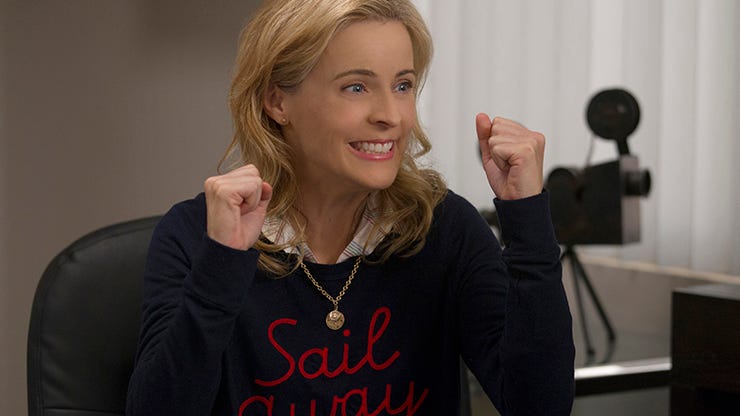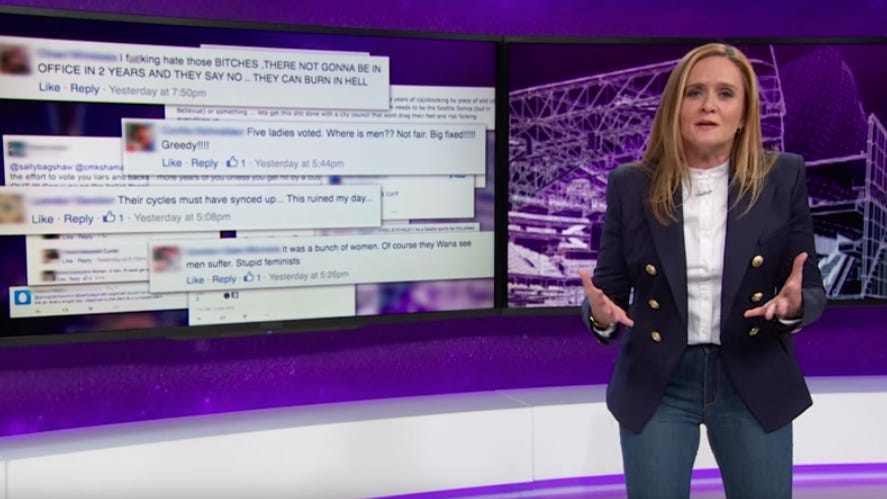Join or Sign In
Sign in to customize your TV listings
By joining TV Guide, you agree to our Terms of Use and acknowledge the data practices in our Privacy Policy.
See You Next Tuesday: How the Most Offensive Word in the Language Became Ubiquitous on TV
Lady Dynamite, Samantha Bee and Veep take on the C-word
(Warning: NSFW/potentially offensive language ahead)
In Episode 4 of Netflix's wonderfully kooky comedy Lady Dynamite, Maria Bamford (playing herself) is wooing a date at a comedy club when her buddy Patton Oswalt stops by their table.
"How do you know this c--t?" Oswald asks Jack (Brandon Routh), who is rightfully shocked and outraged. Maria calms him down by explaining, "C--t is a term of endearment. It's so bad no one would ever say it, so that's why you can say it," which prompts Jack to try it for himself, hilariously butchering the nuance required to pull it off.
The best TV shows of 2016 (so far)

You (kind of) heard Amy Schumer call herself a C-word in her bit with Jennifer Lawrence at the Golden Globes. Samantha Bee toyed with it in promos for Full Frontal, sitting beside Conan O'Brien who assured her the show would be great, despite rumors that she's a C-word (he meant Canadian; she thought he meant the other one). And then there's RuPaul's Drag Race, which, in keeping with the use of the term in gay culture as a campy compliment, has covertly put it right in our faces for many seasons by urging contestants to serve Charisma Uniqueness Nerve and Talent.
Veepdevoted an entire episode to it early this year: "C---gate," in which Selina Meyer (Julia Louis-Dreyfus) learns via Politico that someone on her staff called her the C-word, and dispatches Amy (Ana Chlumsky) to find and fire the person who did it. (It turned out everyone had.) Even for a show that turns filthy name-calling into poetry, hearing the C-bomb tossed around so casually felt like a ramping up of its already certifiable genius -- not just becuase of the word's shock value, but because creating a faux controversy around it was a clever commentary on the misogyny so embedded into our culture too. Selina, of course, is a woman president and while she herself wouldn't hesitate to use the word however she chose, the "gate" she manufactured spoke volumes about the weight words carry, and who is "allowed" to say what.
The best TV cliffhangers of 2016 (so far)
"For me it personally, it does not bother me," says Jodi Miller, a Los Angeles-based comedian and writer who hosts "The C-Word Comedy Show" at the famous Comedy Store in West Hollywood. The C-word, she suggests, is about power, which is why she doesn't give it any. "If someone has called a woman that, in their mind they're thinking it's going to ruin her day or derail her. There was a time calling a woman a b---h was the worst thing you could say; now it's a badge of honor. It's like, 'You're damn straight I'm a b---h.'"
It probably shouldn't come as a surprise that the C-word is bubbling up on TV now. These days, pop stars label themselves "bad bitches"; we're so post-"N-word" controversies that the "rules" around using it became primetime sitcom fodder. In this era -- where nearly everyone knows talking points about hot-button progressive topics including Black Lives Matter, the gender pay gap and transgender rights -- the C-word's shift from off-limits to an ingredient in racy TV feels perfectly timed.
Intent and context matters too, of course. In the U.K., the C-word is tossed around freely, unlike here where, like the F and N word slurs for gay and black people, the C-word is loaded with the threat of physical violence. Just like people in those groups reclaimed slurs and used them in peer-to-peer dialogue, women using the C-word load it with so much irony and controlled ownership that they help diminish the sting.

This was the masterstroke Samantha Bee achieved on Full Frontal earlier this year with her bit "The Seattle Seawards." In a sketch that hammered home the degrading language hurled at women on an everyday basis (like "offers to tear you in half c--t first" as she mentions), Bee showed some of the mean tweets Seattle men sent female politicians after they voted against an expensive and risky sports project in favor of safer expenditures. But instead of portraying the women as victims, Bee turned them into tongue-in-cheek legislative superstars: The Seattle Seawards.
Sure it was funny, but the sketch mirrored what Veep's Selina Meyer revealed to Amy in a rare tender moment on "C---gate": People, Selina says, fundamentally hate women. But by putting the most offensive word in the language right in our faces on TV, more funny ladies are inverting the discrimination they face all the time and flexing, uh, their muscle.
"Especially with comedy and stand-up," Miller says, "comedians are talking about things that people in the audience can't talk about. We're the voice of them in a lot of ways. It's like, 'You think we're going to crumble when you call me that? Let me show you what a c--t can do.'"
